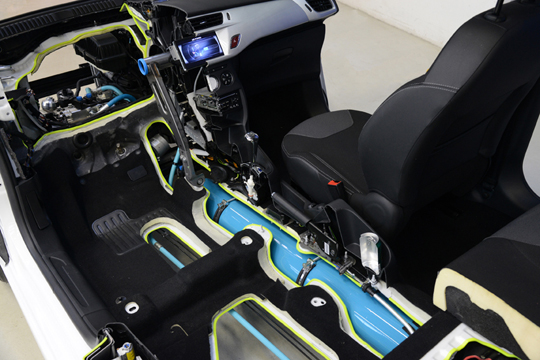Better Than Batteries: A Hybrid Car That Runs on Air

Those in love know the sensation of walking on air. So perhaps it's no surprise that the romantic French would develop a car that gets amazing gas mileage by running on air.
French automaker Peugeot Citroen's latest automotive innovation — named "Hybrid Air" — operates on compressed air, gasoline or a combination of the two, DigitalTrends.com reports. At speeds above 43 mph (70 kilometers per hour), the car uses a standard three-cylinder gasoline engine with an automatic transmission.
But when the driver slows down below 43 mph, as in typical city driving, the car uses compressed air to power a hydraulic motor, allowing the gasoline engine to shut down. When climbing a steep hill or accelerating, the two powertrains work together to give the car the extra oomph it needs, according to MotorAuthority.com.
This unique hybrid system will give the passenger car a whopping 117 mpg (2 liters per 100 kilometers), according to the Daily Mail.
What makes Peugeot's car greener than your average Prius is a technology known as "regenerative braking," DigitalTrends.com reports. In regenerative braking, the car's compressed air storage tanks are refilled with air by harnessing the energy created every time the driver brakes — energy that's usually just dissipated as heat.
And because the car uses no heavy batteries to store electricity, it's lighter than many hybrid cars offered today. Peugeot's Hybrid Air car is currently a concept vehicle, but the company expects to have the vehicle available for purchase by 2016.
It's widely hoped that the Hybrid Air technology will revive the fortunes of the ailing French automaker. Founded in 1810 and still family-owned, the company has been hard-hit by the recession in Europe, and global sales for 2012 were down 8.8 percent, according to the Daily Mail.
Get the world’s most fascinating discoveries delivered straight to your inbox.
The car has met with gushing praise from some industry analysts: "We love this new technology," DigitalTrends.com enthused. "It's so simple; we can't believe someone else hasn't implemented it before."
Follow LiveScience on Twitter @livescience. We're also on Facebook& Google+.
 Live Science Plus
Live Science Plus





